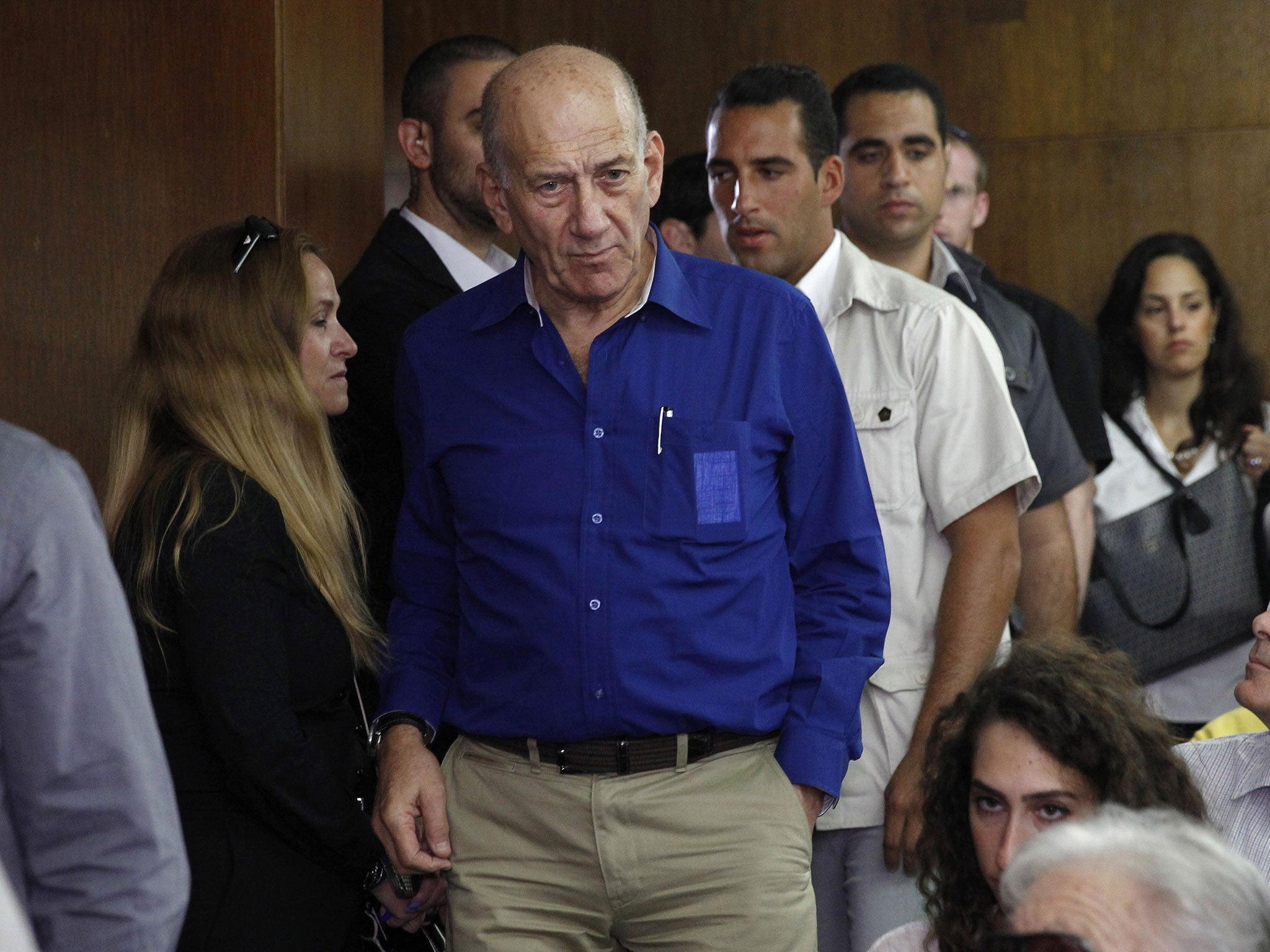Ehud Olmert: Former Israeli prime minister sentenced to eight months in prison
Jailed for unlawfully accepting money from a US supporter

Your support helps us to tell the story
This election is still a dead heat, according to most polls. In a fight with such wafer-thin margins, we need reporters on the ground talking to the people Trump and Harris are courting. Your support allows us to keep sending journalists to the story.
The Independent is trusted by 27 million Americans from across the entire political spectrum every month. Unlike many other quality news outlets, we choose not to lock you out of our reporting and analysis with paywalls. But quality journalism must still be paid for.
Help us keep bring these critical stories to light. Your support makes all the difference.
The former Israeli Prime Minister Ehud Olmert has been sentenced to eight months in prison for taking cash from a US backer, despite an intervention on his behalf by Tony Blair as a character witness.
Olmert, who once spoke of bringing about a peace agreement with the Palestinians, was convicted in March for fraud and breach of trust. In addition to the custodial sentence, the disgraced politician was fined £16,000. He will not serve time immediately, as the court granted him 45 days for an expected appeal.
Eyal Rozovsky, Olmert’s lawyer, said he was “very disappointed” with the judgment, which comes in addition to a six-year jail term Olmert is currently appealing against for taking bribes as part of a controversial property deal.
The charges stem from Olmert’s relationship with the American-Jewish businessman Morris Talansky, who testified in an earlier trial that he gave the politician, then mayor of Jerusalem and a cabinet minister, hundreds of thousands of dollars.
In what has become known as the “cash-envelopes” affair, Mr Talansky said he often gave Olmert money in envelopes to fund his campaigns, but also found the politician had a taste for expensive cigars and lavish hotel rooms that he reported footing the bill for.
Olmert was acquitted of the original charges in 2012, but was taken to trial again when his former officer manager Shula Zaken turned state’s witness and produced incriminating recordings and diary entries.
Olmert has maintained his innocence, and his legal team argued for leniency on account of his record of public service – he served as mayor of Jerusalem for 10 years, as Prime Minister for three years, and in various ministerial positions.
To that end, they produced statements from character witnesses including the ex-Mossad chief Meir Dagan and Mr Blair, who remains the Quartet’s Middle East Envoy although reports have suggested he will soon step down.
In his letter to the court, Mr Blair said his relationship with Olmert extended beyond that of fellow heads of governments, and was based on “friendship and trust”. Praising his “continuous efforts to bring peace with Israel’s neighbours”, Mr Blair added that in his dealings with Olmert he found him to be “a man of his word who could be trusted to keep to what he promised”.
In statement issued after the verdict, Olmert’s lawyers said he had “contributed much to the security of the state of Israel, to the strengthening of its international standing and to the welfare of its citizens – and it would have been appropriate had these things been taken into account.”
The court said it had considered Olmert’s service in sentencing, but a “black flag” still hangs over his conduct.
Rising to Israel’s top job after then premier Ariel Sharon fell into a coma in 2006, Olmert later formed his own government as head of the centrist Kadima (Forward) party. Dogged by corruption allegations from the start, he also faced criticism for perceived mismanagement of the 2006 Lebanon war. He resigned in the face of corruption allegations in 2009.
If his appeals are unsuccessful, Olmert will become the first Israeli head of state to serve time in prison. The country’s new Minister of the Economy, Aryeh Deri, served two years in prison for taking bribes while he was Interior Minister in the 1990s.
Subscribe to Independent Premium to bookmark this article
Want to bookmark your favourite articles and stories to read or reference later? Start your Independent Premium subscription today.
Join our commenting forum
Join thought-provoking conversations, follow other Independent readers and see their replies
Comments